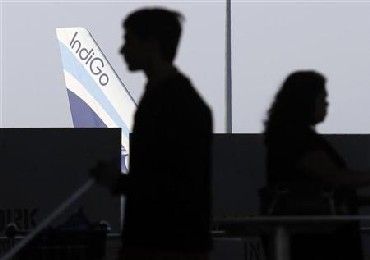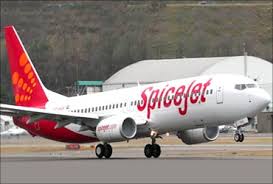 SpiceJet asks DGCA to increase notice period for Q400 aircraft pilots; IndiGo dubs the demand unreasonable and unethical
SpiceJet asks DGCA to increase notice period for Q400 aircraft pilots; IndiGo dubs the demand unreasonable and unethical
Low-cost airline SpiceJet has asked the Directorate General of Civil Aviation to increase the notice period for pilots from six months to a year and fix a three-year lock-in period.
The demand comes in the wake of several pilots quitting the airline and to prevent poaching by rivals.
SpiceJet has said it has suggested a change in service rules for pilots who fly turboprop planes serving regional routes and not for those operating Boeing 737 or Airbus A320 planes.
However, SpiceJet's demand has led to criticism and IndiGo has termed the demand unethical and unreasonable.
IndiGo is the largest domestic airline by market share with 99 Airbus A320s and employs about 1,400 pilots.
DGCA rules require pilots to service a six-month notice period before changing jobs.
This rule was introduced in 2009 following several instances of flight cancellations because of mass resignation of pilots.
SpiceJet made the demand after pilots quit to join IndiGo and some Gulf airlines. Other domestic airlines, including GoAir and Air India, have also seen a spate of pilot resignations recently.
IndiGo has denied charges of poaching and said its recruitment is undertaken in strict accordance with DGCA guidelines.
“The request was made to DGCA with regard to Bombardier Q400s and not Boeing 737 planes.
“Regional connectivity is largely based on Q400 and ATR planes whose pilots are being poached by Boeing, Airbus operators,” a SpiceJet spokesperson said in an email response.
The spokesperson said the current six-month notice period is inadequate and added it takes four years to train junior pilots to a commander's post on Q400 planes.
With the recent spate of resignations, the airline is left in the lurch. The airline did not specify how many Q400 pilots resigned in recent months.
SpiceJet operates a fleet of 20 Boeing 737s and 14 Bombardier Q400s.
The Q400 aircraft are flown on regional routes.
“Is it a pilot's fault that he flies a smaller plane?
“There should not be any embargo placed on the free movement of pilots provided the movement is in compliance with the current DGCA requirements.
“Any further unreasonable enhancement of the notice period that targets pilots is not only unethical but also unreasonable and will be in clear violation of the fundamental rights of an Indian citizen guaranteed by the Constitution of India and in restraint of trade and profession under the applicable provisions of the Indian Contract Act.
“This sort of vested non-tariff barriers will forever stymie the growth of aviation in India," IndiGo president Aditya Ghosh said in a statement.
 Air India and other private airlines did not immediately respond to Business Standard’s queries on the imatter.
Air India and other private airlines did not immediately respond to Business Standard’s queries on the imatter.
The issue regarding poaching of pilots by IndiGo was raised in a meeting between airlines and the Directorate General of Civil Aviation earlier this month.
In that meeting, the civil aviation regulator expressed concern over resignation of pilots operating ATRs and Q400s as these aircraft transport passengers from remote areas to metros.
Joint director general Lalit Gupta also told the airlines to avoid lateral induction of pilots from smaller planes such as Q400 as this practice will hamper the regional connectivity.
DGCA has also instructed all airlines to follow rules with regard to pilots notice period.
TERMS OF CONTRACT
- SpiceJet has asked the DGCA to increase the notice period for pilots flying regional routes from six months to a year and fix a three-year lock-in period for pilots
- The airline csays the current notice is inadequate and added it takes four years to train junior pilots to a commander's post on Q400 planes
- DGCA rules require pilots to serve six months notice period before changing jobs. This rule was introduced in 2009 following several instances of flight cancellations due to mass resignations
- SpiceJet says its regional connectivity is largely based on Q400 and ATR planes whose pilots are being poached by Boeing, Airbus operators







 © 2025
© 2025